Exercise Muscle

Can stretching after exercise prevent muscle soreness ?
Stretching after exercise can help reduce muscle soreness and improve flexibility, but it is important to wait for enough time, choose appropriate stretches, be mindful of pain, and use proper technique.

How does exercise affect muscle growth and repair at a cellular level ?
Exercise stimulates protein production for muscle growth and repair, increases satellite cells for new muscle fibers, boosts blood flow for nutrient delivery and waste removal, and promotes the release of growth factors like IGF-1.

What are the best exercises for building muscle at the gym ?
The article discusses the best exercises for building muscle at the gym, including free weights, machines, and bodyweight exercises. Free weight exercises like squats, deadlifts, and bench press target multiple major muscle groups for overall strength and muscle growth. Machine exercises such as leg press, lat pulldown, and seated row allow for isolation of specific muscles while still allowing heavy lifting. Bodyweight exercises including push-ups, pull-ups, and squat jumps require no equipment and can be done anywhere for convenient muscle building.

Is it possible to build muscle with office-friendly exercises ?
In today's fast-paced world, many people spend a significant portion of their day sitting at a desk. This sedentary lifestyle can lead to various health problems, including muscle loss. However, the good news is that it is possible to build muscle with office-friendly exercises. In this article, we discussed some effective exercises that can be done in an office setting, including bodyweight exercises like push-ups, squats, and lunges, as well as resistance band exercises like bicep curls, tricep dips, and shoulder press. By incorporating these exercises into your routine, you can improve your overall fitness and health while sitting at your desk all day.

Can stretching before exercise help prevent sports injuries ?
Stretching before exercise is believed to prevent sports injuries by improving flexibility and range of motion, but its effectiveness is debated due to limited scientific evidence. While some studies suggest stretching may increase injury risk, many experts still recommend it as part of an exercise routine. To stretch safely, warm up first, hold stretches for at least 30 seconds, avoid bouncing, focus on major muscle groups, and listen to your body's signals.
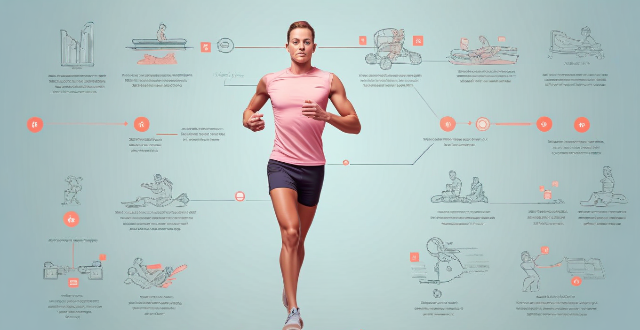
How does exercise physiology explain the benefits of high-intensity interval training (HIIT) ?
High-intensity interval training (HIIT) is a form of exercise that involves short, intense bursts of activity followed by periods of rest or low-intensity exercise. From an exercise physiology perspective, HIIT offers numerous benefits, including increased metabolic rate, improved cardiovascular health, muscle development and endurance, favorable hormonal responses, mental health advantages, reduced injury risk, and time efficiency. These factors make HIIT a popular and effective method for achieving various fitness goals.

How do I prevent muscle soreness after a long run ?
To prevent muscle soreness after a long run, you should warm up properly, stretch your muscles, drink plenty of water, eat a balanced diet, and rest between workouts. Following these tips can help reduce the risk of injury and improve performance in future runs.

How does warming up prevent injuries during exercise ?
Warming up is crucial for preventing injuries during exercise by raising body temperature, increasing blood flow, and loosening up muscles. It also prepares the mind for the upcoming activity. General warm-up exercises increase overall body temperature, while specific exercises mimic the movements of the sport or activity. An effective warm-up routine should start slowly, focus on major muscle groups, include gentle stretches, and not be rushed. Incorporating a thorough warm-up can significantly reduce the risk of injuries and improve performance.

Can dehydration really cause muscle cramps during physical activity ?
Dehydration can lead to muscle cramps during physical activity due to loss of essential electrolytes and reduced oxygen supply to muscles. Signs of dehydration include thirst, dark urine, fatigue, dizziness, dry mouth, headache, and constipation. To prevent dehydration and muscle cramps, stay hydrated, eat a balanced diet rich in electrolytes, stretch before and after exercise, gradually increase intensity, and rest when needed.

How does sleep deprivation affect muscle recovery after workouts ?
Sleep is crucial for muscle recovery after workouts, as it allows the body to repair and rebuild damaged muscle tissue. Sleep deprivation reduces growth hormone production and protein synthesis, leading to inefficient muscle recovery. Strategies for improving sleep quality include establishing a consistent sleep schedule, creating a relaxing bedtime routine, avoiding screens before bed, getting plenty of exercise, and creating a comfortable sleeping environment. By prioritizing sleep, you can improve muscle recovery and overall health.
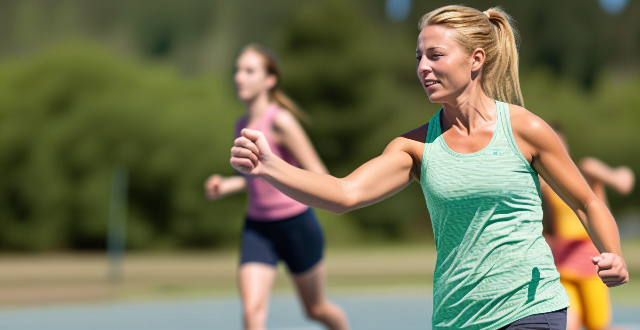
How can sports education help prevent injuries and promote safe exercise habits ?
Sports education is crucial for preventing injuries and promoting safe exercise habits. It emphasizes proper warm-up and cool-down exercises, correct technique and form, safety equipment and gear, stretching and flexibility, hydration and nutrition, and rest and recovery. By providing athletes with the necessary knowledge, skills, and attitudes, sports education helps them avoid common mistakes that lead to injuries and develop healthy exercise routines.

What are the latest research findings in exercise physiology that can benefit amateur athletes ?
This text discusses the latest research findings in exercise physiology for amateur athletes, including the benefits of High-Intensity Interval Training (HIIT), recovery techniques, nutrition and hydration, and mental health strategies. Incorporating these findings can help amateur athletes improve their performance, prevent injuries, and achieve their fitness goals.

Can sports supplements help with muscle recovery after workouts ?
Can Sports Supplements Help with Muscle Recovery After Workouts? Physical exercise and workouts are essential for maintaining a healthy lifestyle, but they can also lead to muscle fatigue and soreness. Many athletes and fitness enthusiasts turn to sports supplements to aid in muscle recovery after workouts. But do these supplements really work? Let's explore the topic in detail. What are Sports Supplements? Sports supplements are dietary products designed to enhance athletic performance, improve physical health, and support recovery from exercise. They come in various forms, including powders, pills, and liquids, and can be consumed before, during, or after workouts. Types of Sports Supplements - Protein Powders: Help in muscle repair and growth. - Creatine: Boosts energy production in muscles. - Branched-Chain Amino Acids (BCAAs): Support muscle building and recovery. - Glutamine: Aids in muscle recovery and immune function. - Omega-3 Fatty Acids: Reduce inflammation and promote heart health. - Multivitamins/Minerals: Support overall health and wellness. How Do Sports Supplements Help with Muscle Recovery? - Protein Powders: Consuming protein powders after a workout can help replenish depleted amino acids, leading to faster recovery times. - Creatine: Increases the availability of phosphocreatine, which helps regenerate ATP more quickly during high-intensity exercises, reducing muscle fatigue and aiding in recovery. - BCAAs: Consuming BCAA supplements before or during workouts can reduce muscle damage and speed up recovery processes. - Glutamine: Supports muscle recovery by helping maintain cellular volume and preventing muscle breakdown. It also supports immune function, which is important for overall health and recovery. - Omega-3 Fatty Acids: Have anti-inflammatory properties that can help reduce muscle soreness and stiffness after workouts. They also support heart health, which is crucial for athletes who engage in cardiovascular exercises. - Multivitamins/Minerals: While not directly related to muscle recovery, consuming multivitamins or minerals can support overall health and wellness, which indirectly aids in recovery processes. Are Sports Supplements Safe? While sports supplements can be beneficial for some individuals, it's important to note that they are not regulated by the Food and Drug Administration (FDA). This means that their safety and effectiveness may vary between brands and products. It's always best to consult with a healthcare professional before starting any supplement regimen. Additionally, relying solely on supplements without proper nutrition and rest can be counterproductive. A balanced diet, adequate sleep, and proper hydration are still key components of effective muscle recovery.

Is it necessary to stretch every muscle group after a workout ?
Stretching after a workout is often considered an essential part of any exercise routine. It helps in improving flexibility, reducing muscle soreness, and preventing injuries. However, the question remains: is it necessary to stretch every muscle group after a workout? Let's delve into this topic and explore the benefits and considerations associated with post-workout stretching.### Importance of Post-Workout Stretching Improved Flexibility Stretching after a workout can help maintain and improve flexibility over time. When muscles are warmed up from the exercise, they become more pliable, making it easier to stretch them. Regular stretching can lead to increased range of motion and better overall flexibility. Reduced Muscle Soreness Stretching can help reduce muscle soreness that may occur after a strenuous workout. By elongating the muscles, stretching promotes blood flow, which aids in the removal of lactic acid and other waste products that contribute to muscle soreness. Injury Prevention Stretching can also play a role in injury prevention. By increasing flexibility and range of motion, stretching can help reduce the risk of strains, sprains, and other injuries that may occur during physical activity.### Considerations for Post-Workout Stretching Not All Muscles Need to Be Stretched While stretching is generally beneficial, it's not necessary to stretch every muscle group after every workout. The focus should be on the muscles that were primarily engaged during the exercise session. For example, if you completed a lower body workout, it would be more beneficial to stretch your legs rather than your arms. Quality Over Quantity It's important to prioritize the quality of your stretches over the quantity. Performing a few well-executed stretches is more effective than rushing through multiple stretches without proper form or technique. Take the time to hold each stretch for at least 15-30 seconds, ensuring that you feel a gentle stretch without any pain or discomfort. Listen to Your Body Your body will provide clues about which muscles need stretching. If you experience tightness or stiffness in a particular muscle group, it's a good idea to focus on stretching those areas. Conversely, if a muscle group feels loose and relaxed, there may be no need to stretch it extensively.### Conclusion In conclusion, while stretching every muscle group after a workout is not strictly necessary, incorporating stretching into your post-workout routine can offer numerous benefits. By focusing on the muscles that were heavily engaged during your exercise session and prioritizing quality over quantity, you can improve flexibility, reduce muscle soreness, and potentially prevent injuries. Remember to listen to your body and adjust your stretching routine accordingly for optimal results.
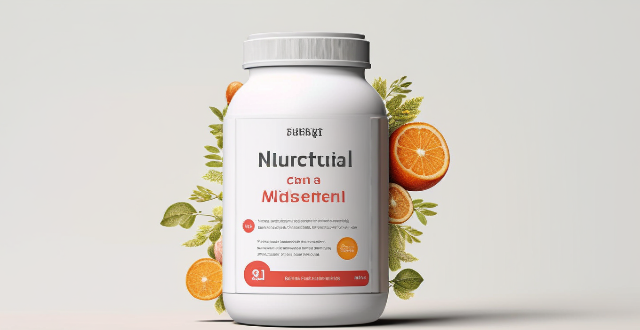
How do sports nutrition supplements affect muscle recovery after a workout ?
Sports nutrition supplements can significantly support muscle recovery post-workout by providing essential nutrients. Protein supplements like whey and casein replenish amino acids, while carbohydrate supplements such as BCAAs and beta-alanine reduce soreness and fatigue. Other nutrients, including creatine, glutamine, and vitamins/minerals, further enhance recovery. A structured supplementation routine, tailored to individual needs, can optimize muscle recovery and athletic performance.
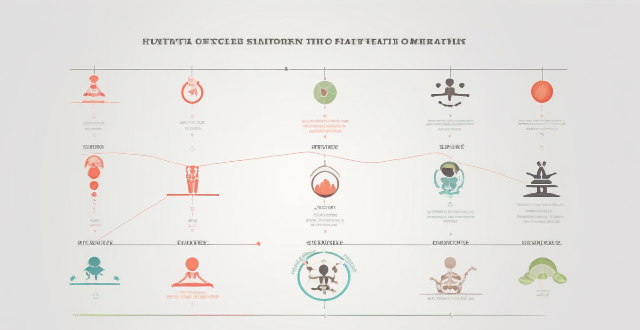
Are there any specific training methods that celebrities use for muscle building and fat loss ?
Celebrities use a variety of training methods and nutrition plans to achieve their desired physique, including High-Intensity Interval Training (HIIT), weightlifting, cardiovascular exercise, Pilates and yoga, functional training, and strict nutrition plans. These methods are designed to burn fat, build muscle, improve flexibility and balance, and support overall fitness and mobility. However, individual results may vary depending on various factors.

What role does muscle strength training play in preventing chronic diseases ?
Muscle strength training can help prevent chronic diseases such as heart disease, stroke, type 2 diabetes, and some types of cancer. It also has many benefits for physical and mental health, including improved cardiovascular health, weight management, better bone health, reduced risk of type 2 diabetes, enhanced mental health, increased self-esteem, improved physical function, lowered blood pressure, and cancer prevention. To get started with muscle strength training, it is important to start low and slow, mix up your routine, rest enough, stay hydrated, eat right, and get enough sleep. With dedication and consistency, you can achieve great results!

What kind of foods should I eat to aid in muscle recovery
Eating a balanced diet that includes carbohydrates, protein, healthy fats, water, and vitamins and minerals is essential for muscle recovery after exercise. Complex carbohydrates provide energy for muscles during recovery, while protein helps repair and grow them. Healthy fats support overall health and reduce inflammation. Drinking enough water flushes out toxins and maintains a healthy fluid balance in the muscles. Vitamins and minerals, such as vitamin C, vitamin D, and iron, are also important for muscle function and recovery.

How do sports monitoring systems analyze muscle activity and fatigue ?
Sports monitoring systems analyze muscle activity and fatigue by employing various technologies and methodologies, including: 1. Electromyography (EMG) to measure electrical muscle activity and detect fatigue indicators. 2. Heart rate monitoring to track intensity, recovery, and heart rate variability (HRV). 3. Accelerometry to track motion patterns and assess fatigue through changes in movement quality. 4. Force plates and pressure mats for measuring ground reaction forces and load distribution. 5. Blood lactate testing as a metabolic indicator of anaerobic metabolism and fatigue. 6. Perception-based scales like Ratings of Perceived Exertion (RPE) for subjective feedback on exertion levels. 7. Sleep tracking to monitor sleep duration, quality, and rest disruptions. 8. Environmental monitoring to account for external conditions affecting performance and fatigue. These systems provide valuable insights into an athlete's performance, enabling coaches and athletes to adjust training regimens, prevent overtraining, and enhance overall sports performance.

Can aerobic exercise improve my cardiovascular health ?
Aerobic exercise is essential for maintaining and improving cardiovascular health, offering benefits such as strengthened heart muscle, lowered blood pressure, increased HDL cholesterol, reduced inflammation, weight management, improved circulation, and better blood sugar regulation. Regular aerobic activities like walking, jogging, cycling, swimming, or group fitness classes can significantly enhance overall heart health. The American Heart Association recommends at least 150 minutes of moderate-intensity aerobic exercise weekly, spread throughout the week, to achieve these benefits.
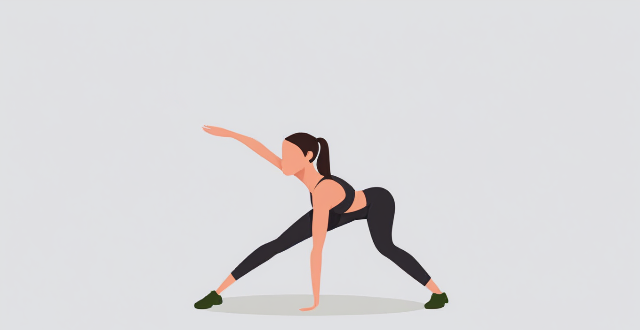
How does exercise help in managing stress ?
Stress is an inevitable part of life, but regular exercise can help manage it effectively. Exercise releases endorphins, reduces muscle tension, improves sleep quality, boosts self-esteem and confidence, provides a sense of accomplishment, and promotes social interaction. To incorporate exercise into your daily routine, start slowly, find an activity you enjoy, make it a part of your routine, mix up your routine, and don't overexert yourself. By doing so, you can reap the numerous benefits of exercise for stress management and overall well-being.

How does exercise influence aging and longevity ?
Exercise is crucial for maintaining good health and well-being, with numerous benefits including improved cardiovascular health and reduced risk of chronic diseases. It also has a significant impact on aging and longevity, as regular physical activity can help maintain muscle mass, improve bone density, and reduce the risk of chronic diseases. Exercise also has mental health benefits, such as improved cognitive function and reduced risk of depression and anxiety. Numerous studies have shown that exercise can lead to an increased lifespan by reducing the risk of premature death from various causes. Examples of long-lived populations, such as the Okinawans and Nicoyans, demonstrate the importance of an active lifestyle in promoting healthy aging and longevity. Incorporating exercise into your daily routine can lead to a higher quality of life during your golden years and potentially extend your lifespan.
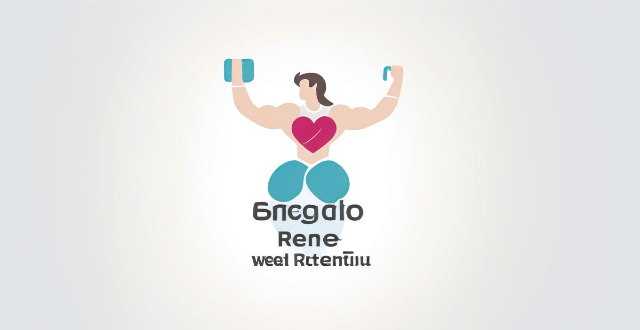
Can aerobic exercise help me lose weight ?
Aerobic exercise, or cardio, is an effective way to lose weight. It increases heart rate and breathing, leading to higher calorie burn during and after the workout. Moderate-intensity aerobic activities also use fat as fuel, improving metabolic rate for further calorie expenditure at rest. Regular cardio can strengthen heart muscles for efficient blood pumping and contribute to muscle endurance. Types of aerobic exercises include running, cycling, swimming, walking, and group fitness classes like Zumba. To successfully incorporate aerobic exercise into a weight loss plan, it's recommended to start slowly, mix up activities, stay consistent, and combine with strength training. Potential challenges such as overexertion and plateaus in progress should be managed by adjusting routines. Overall, aerobic exercise can aid in weight loss when part of a balanced fitness regimen.
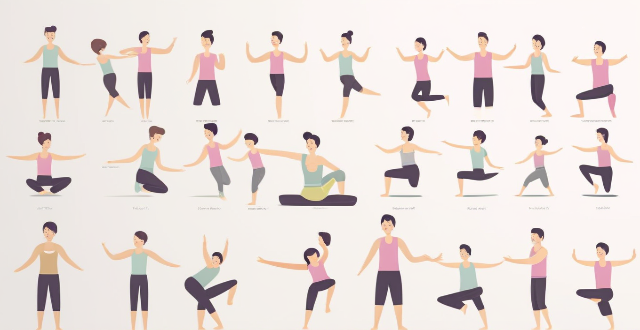
What are the best types of exercises for stress relief ?
The best types of exercises for stress relief include aerobic exercise, yoga, pilates, tai chi, and strength training. Aerobic exercise increases your heart rate and makes you sweat, which can help to reduce stress levels. Yoga helps to calm the mind and body, reducing stress and anxiety levels. Pilates focuses on strengthening the core muscles, improving posture and balance, and increasing flexibility. Tai Chi combines deep breathing with slow, flowing movements and has been shown to be effective in reducing stress levels. Finally, strength training involves using resistance bands or weights to build muscle strength and endurance.

How does exercise influence self-esteem ?
Exercise has a profound impact on self-esteem, positively influencing confidence, body image, and mental health. Physical benefits include weight management through fat reduction and muscle tone, as well as improved cardiovascular health and immune system function. Mental benefits include stress reduction through endorphin release and mindfulness, and enhanced cognitive function with improved memory and problem-solving abilities. Social benefits come from community building through group activities and support systems, as well as personal achievement through goal setting and feedback. Overall, regular physical activity can significantly enhance self-esteem by promoting physical, mental, and social well-being.
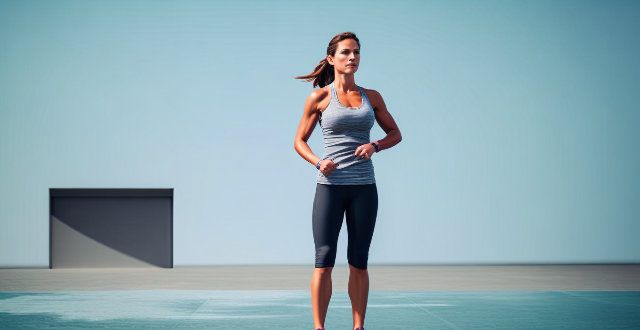
How much weight can I expect to lose by exercising regularly ?
The amount of weight you can expect to lose through exercise depends on several factors, including your current weight, body composition, and the type and intensity of exercise you perform. High-intensity interval training (HIIT) and strength training are generally more effective for weight loss than low-impact activities like yoga or walking. In the short term, you may experience significant weight loss due to water loss and increased muscle tone, but for long-term weight loss, regular exercise combined with a healthy diet is essential. To maximize your weight loss potential through exercise, incorporate strength training, vary your workouts, increase intensity gradually, and stay consistent.